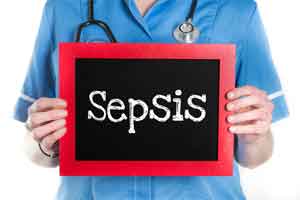- Home
- Editorial
- News
- Practice Guidelines
- Anesthesiology Guidelines
- Cancer Guidelines
- Cardiac Sciences Guidelines
- Critical Care Guidelines
- Dentistry Guidelines
- Dermatology Guidelines
- Diabetes and Endo Guidelines
- Diagnostics Guidelines
- ENT Guidelines
- Featured Practice Guidelines
- Gastroenterology Guidelines
- Geriatrics Guidelines
- Medicine Guidelines
- Nephrology Guidelines
- Neurosciences Guidelines
- Obs and Gynae Guidelines
- Ophthalmology Guidelines
- Orthopaedics Guidelines
- Paediatrics Guidelines
- Psychiatry Guidelines
- Pulmonology Guidelines
- Radiology Guidelines
- Surgery Guidelines
- Urology Guidelines
Smart technology to diagnose sepsis in children

Smart technology and artificial intelligence could be used to improve detection of sepsis in children, reports a new study published in the Canadian Medical Association Journal.
In developing countries, several recent deaths highlight the need for reliable, fast identification of early sepsis, as the condition can be lethal if not treated quickly.
"The optimal sepsis trigger tool needs to be rapid, objective, accurate and low cost; must easily integrate into the current workflow of a busy clinical setting; should require minimal training and require minimal additional effort; and offer a clear clinical benefit, particularly in community settings where the prevalence and clinical experience with sepsis is likely to be low," writes Mark Ansermino, University of British Columbia and BC Children's Hospital, Vancouver, BC, with coauthors.
Read Also:Sepsis care within an hour associated with reduced mortality in children: JAMA
The authors suggest that current smart technologies, like those used to program washing machines and automate medical imaging processing, could be utilized to automate data combinations of sepsis symptoms and other relevant information.
"The recognition and anticipation of sepsis represent an important opportunity for artificial intelligence to revolutionize health care, by optimizing algorithms to a degree of accuracy that would avoid alert fatigue and optimize efficiencies in workflow," they write.
Better collection of patient outcome data and integration into medical records is needed.

Disclaimer: This site is primarily intended for healthcare professionals. Any content/information on this website does not replace the advice of medical and/or health professionals and should not be construed as medical/diagnostic advice/endorsement or prescription. Use of this site is subject to our terms of use, privacy policy, advertisement policy. © 2020 Minerva Medical Treatment Pvt Ltd